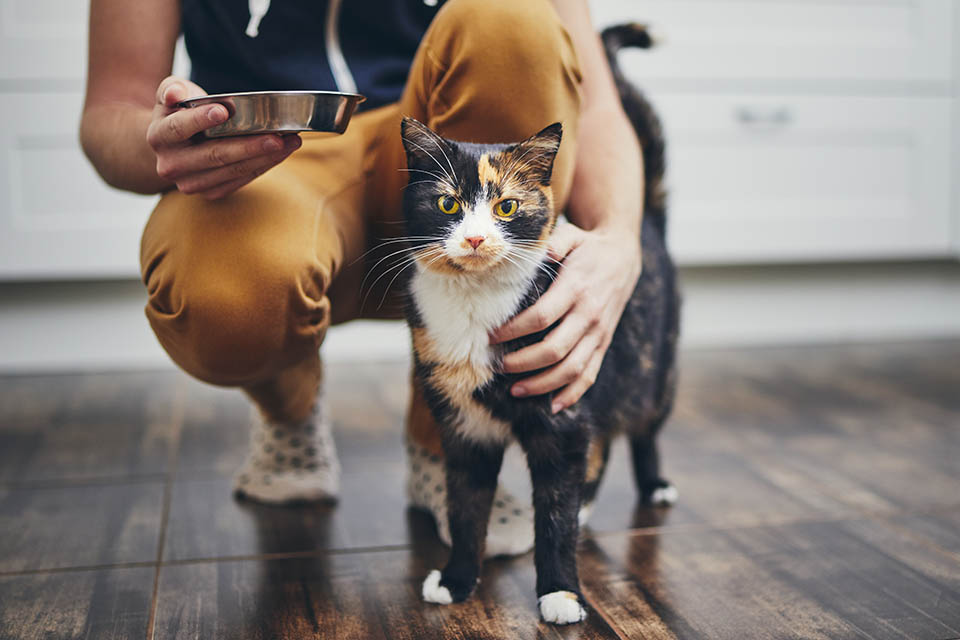By. Dr. Enjolie Levengood
October 12 is Pet Obesity Awareness Day and it’s important to understand pet obesity and the health complications that it may cause your pet. IndyVet doctor, Dr. Enjolie Levengood, goes over pet obesity and the importance of monitoring your pet’s caloric intake and the risks associated with overweight pets.
What is obesity?
Obesity is an accumulation of excess body fat past the point of being overweight that it can compromise
overall health. Dogs are considered overweight if they are 10-20% over their ideal body weight and
obese if they weigh over 20% of their ideal body weight.
Is my pet overweight?
A simple way to tell if your pet is overweight is to look and feel your pet. Your veterinarian can also aid
in this process. Looking at your pet from the side, you should be able to see an upward tuck to your
pet’s belly. Secondly, looking at your pet from above, you should be able to see an hourglass shape.
Lastly, you should be able to feel your pet’s ribs as you run your hands along their sides. Your
veterinarian also uses these factors and associated scales to rate the body condition score of your pet.
You can follow these links for more detailed charts made by the World Small Animal Veterinary
Association (WSAVA) and the American Animal Hospital Association (AAHA):
WSAVA Cat Body Condition Scoring
WSAVA Dog Body Condition Scoring
AAHA Body Condition Scoring
What causes obesity?
Obesity is caused by more calories being consumed than the body needs and over time this leads to
excess stores of fat. Additionally, some pets are more predisposed to developing obesity. Pets are at an
increased risk of developing obesity if they are spayed or neutered, indoor only, inactive, and middle-
aged to older. That being said, some diseases (hypothyroidism, Cushing’s) and medications (steroids)
can cause weight gain. Overall, if you are worried about your pet’s weight, work with your veterinarian
to develop a diet and exercise plan. Your veterinarian can calculate the daily calorie needs for your pet
and ensure that the food you are giving (including treats, pill pockets, or any scraps) are within that daily
requirement.
What are the consequences of obesity?
Obesity can have a negative effect on the overall health and well-being of your pet. Obese pets have
decreased activity, which can increase anxiety and decrease mental stimulation and happiness. Obese
pets are also at a greater risk for multiple diseases. Overweight and obese pets are at an increased risk
of developing arthritis and other joint diseases, like an ACL tear. Overweight and obese dogs are also at
an increased risk for breathing difficulties, complications during anesthesia, high blood pressure, and
hormonal diseases. The most concerning of these is diabetes.
What’s the importance of obesity and diabetes?
Diabetes is a disease of the pancreas, which excretes insulin and digestive enzymes. The digestive
enzymes help break down food for energy, mainly glucose. Glucose is used by cells as energy and is
taken up by cells due to insulin. When the pancreas is diseased, insulin levels are too low or the body is
unable to use insulin appropriately. This causes increased levels of glucose in the blood, which causes
the typical signs of diabetes: increased thirst, increased urination, weight loss, and increased appetite.
Overweight cats are 4x more likely to develop diabetes. Diabetes in cats is similar to Type 2 diabetes in
humans. Cats have an issue of insulin resistance and require supplementation of insulin in order to
process glucose. Dogs, on the other hand, develop diabetes similar to Type 1 diabetes in humans. Being
overweight does not increase the risk for developing diabetes in dogs, but it can make their disease
management more difficult. Overweight dogs have an increased risk for concurrent diseases, systemic
inflammation, and insulin resistance. Insulin resistance can put your pet at an increased risk for a
diabetic crisis as well.
Overall, obesity is common in pets and can be well controlled between your and your regular
veterinarian and can lead to a happier, healthier life for your pet.

